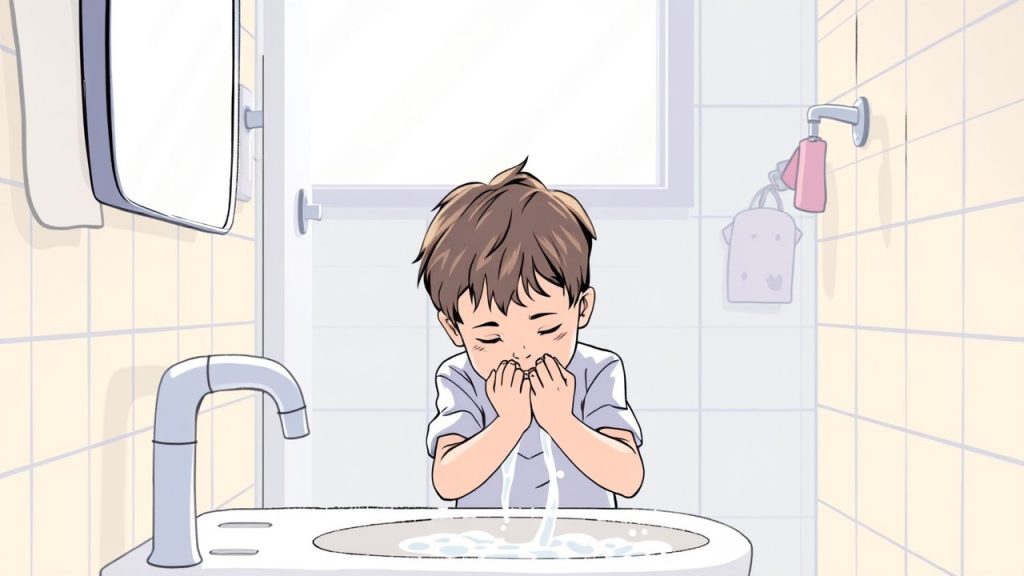Being a parent, you’re the person who understands your child more than anyone. You notice the small details – the way they line up their toys, how they ask the same question multiple times or their sudden aversion to dirt. While these behaviors might seem innocent at first, they can sometimes be early signs of a more significant issue, like Obsessive-Compulsive Disorder (OCD). Early signs of OCD in children can include repetitive behaviors like washing hands excessively, distressing thoughts or seeking constant reassurance. But how can you tell if your child’s actions are just part of growing up or something that requires closer attention?
In this comprehensive guide, we will explore the early signs of OCD in children and provide practical advice on how to recognize and respond to them. By understanding these early indicators, you can help your child get the support they need before their symptoms become more severe.
Understanding the Basics of OCD in Children
Obsessive-Compulsive Disorder (OCD) is a mental health condition characterized by obsessions—unwanted, intrusive thoughts—and compulsions—repetitive behaviors that a person feels driven to perform. For children, these behaviors can be confusing and distressing, especially when they don’t understand why they’re doing them.
OCD is not uncommon in children. It’s estimated that between 1% and 3% of children are affected by OCD worldwide. While it often develops during adolescence, many children exhibit signs of OCD at a much younger age, sometimes as early as 5 or 6 years old. The symptoms can manifest in a variety of ways, and early intervention is key to helping children manage the disorder and improve their quality of life.

Understanding OCD: Obsessions vs. Compulsions
To better understand OCD in children, it’s essential to differentiate between obsessions and compulsions:
- Obsessions: Intrusive, irrational thoughts or fears that cause distress. For example, a child might obsess over germs or fear that something terrible will happen to a loved one if they don’t perform certain rituals.
- Compulsions: Behaviors or actions that a child feels compelled to repeat in response to their obsessions. These can include handwashing, counting, or repeating specific words or phrases.
While everyone has occasional worries or repetitive behaviors, the key difference with OCD is that these thoughts and actions become excessive and disruptive, interfering with daily activities and causing significant anxiety.
Early Behavioral Signs of OCD in Children
Repetitive and Ritualistic Behaviors
One of the most common early signs of OCD in children is the development of ritualistic behaviors. These can manifest in seemingly ordinary actions but are repeated so often that they disrupt daily routines.
- Excessive Handwashing: Your child might wash their hands multiple times in a row, even if they haven’t touched anything dirty. They might spend extended periods in the bathroom, rubbing their hands raw with soap.
- Organizing and Rearranging Objects: Does your child insist on lining up their toys in a specific way or constantly rearranging their school supplies? While organizing is a common childhood habit, a child with OCD may spend excessive amounts of time ensuring that objects are symmetrical or in “perfect” order.
- Checking Doors, Windows, or Locks: Some children develop rituals around safety, repeatedly checking that doors are locked, windows are closed, or that the oven is turned off. They may ask you multiple times if things are secure, even after being reassured.
These rituals often go beyond normal childhood behavior. While it’s common for kids to be a little quirky or develop habits, OCD-related rituals are more rigid and time-consuming, often taking priority over other activities, such as playtime or homework.
Obsessive Thoughts and Fears
In addition to physical behaviors, OCD often manifests through intrusive and obsessive thoughts. Your child might not express these fears outright, but their actions may give clues.
- Fear of Germs or Contamination: Children with OCD often have an overwhelming fear of germs or getting sick. This can lead to behaviors like refusing to touch certain objects or avoiding certain places altogether.
- Worry About Harm Coming to Loved Ones: Another common obsession in children with OCD is the fear that something terrible will happen to a family member or friend. This may lead to repetitive questions such as, “What if something bad happens to you?” or intense anxiety when a parent is running late.
- Intrusive, Disturbing Thoughts: Children with OCD may experience distressing thoughts that seem to come out of nowhere. These can include inappropriate or violent images, causing the child a great deal of anxiety and confusion. Because these thoughts are so troubling, the child may be reluctant to share them, making it harder for parents to identify the issue.
If you notice your child asking repetitive questions or showing signs of extreme worry over everyday situations, it could indicate that they’re dealing with obsessive thoughts.
Emotional and Cognitive Indicators
Anxiety and Distress Around Specific Triggers
Children with OCD often experience heightened anxiety around specific objects, places, or situations that trigger their obsessions. If your child becomes distressed when they can’t engage in their usual rituals or routines, this could be a sign of OCD.
For example:
- Panic After Touching a “Dirty” Object: If your child accidentally touches something they perceive as dirty—such as a public doorknob or a classroom desk—they might become visibly upset and insist on immediately washing their hands.
- Fear of Unlucky Numbers or Words: Some children with OCD develop superstitions around certain numbers, words, or phrases. For instance, they may refuse to say certain words or may avoid looking at clocks when they display specific times.
In many cases, these obsessions cause significant emotional distress. The child may become tearful, anxious, or even angry when they’re unable to complete their rituals or avoid their triggers.

Perfectionism and the Need for Control
Children with OCD often exhibit perfectionist tendencies, driven by an overwhelming need to get things “just right.” This perfectionism can manifest in various aspects of their lives, including schoolwork, play, and daily routines.
- Rewriting Homework: A child might spend excessive amounts of time rewriting their homework because the handwriting isn’t “perfect.” This can lead to frustration and exhaustion as the child feels an intense need to make everything flawless.
- Overwhelming Focus on Details: Whether it’s lining up toys in perfect rows or ensuring their clothes are folded a certain way, a child with OCD can become overly focused on details that may seem trivial to others.
Children with OCD may also seek constant reassurance from parents, teachers, or friends to confirm that they’ve done something correctly. This need for reassurance can be emotionally draining for both the child and those around them.
Physical and Behavioral Impact
Avoidance of Certain Situations
To cope with their obsessions, children with OCD often begin to avoid specific situations or places that trigger their anxiety. While avoidance may provide temporary relief, it ultimately reinforces their fears and can lead to increased isolation and distress.
- Avoiding Social Events: Some children may avoid social gatherings, birthday parties, or playdates because they fear contamination or embarrassment over their compulsions. They may also feel anxious about encountering their obsessions in public settings.
- Skipping School: Children with OCD may develop anxiety about going to school if they associate the environment with their obsessions (e.g., fear of germs, and making mistakes in class). As a result, they may frequently ask to stay home or visit the nurse’s office.
Fatigue and Disruption of Daily Routines
OCD can be mentally and physically exhausting for children. The constant need to perform rituals and the stress of managing their obsessions can take a significant toll on their well-being.
- Exhaustion Due to Rituals: Performing repetitive behaviors can take up so much time that it interferes with basic routines like eating, sleeping, or getting ready for school. A child with OCD may spend hours performing rituals at night, leaving them tired and irritable the next day.
- Difficulty Concentrating at School: The mental energy consumed by obsessive thoughts can make it hard for children to focus on their schoolwork. Teachers might notice that a child with OCD is easily distracted or struggles to complete assignments on time.
The constant worry and pressure to complete rituals can lead to physical symptoms such as headaches, stomachaches, and other signs of stress.
When to Seek Professional Help
If you suspect that your child may be showing signs of OCD, it’s important to seek professional help early. Early intervention can prevent symptoms from worsening and provide your child with the tools they need to manage their OCD effectively.
- Cognitive Behavioral Therapy (CBT): CBT, specifically Exposure and Response Prevention (ERP), is considered the most effective form of therapy for children with OCD. ERP involves exposing the child to their fears (e.g., touching a “dirty” object) while preventing them from engaging in their compulsions (e.g., handwashing). Over time, this helps the child reduce their anxiety and break the cycle of OCD.
- Medication: In some cases, a doctor may recommend medication, such as selective serotonin reuptake inhibitors (SSRIs), to help reduce OCD symptoms. Medication is typically used in combination with therapy.
- Consult a Specialist: If you notice that your child’s behaviors are causing significant distress or interfering with their daily life, it’s essential to consult a pediatrician or child psychologist who specializes in OCD.
Many parents find it helpful to keep a journal of their child’s behaviors, noting any patterns or triggers. This information can be invaluable when meeting with a healthcare professional, as it provides insight into how the OCD is manifesting.

FAQs About Early Signs of OCD in Children
Can OCD develop in very young children?
Yes, OCD can develop in children as young as 5 or 6 years old. While it’s more common to see symptoms emerge during the later years of childhood or adolescence, younger children can also show signs of OCD. Early signs may include repetitive play, excessive worry, or an over-focus on cleanliness and order.
What sets OCD apart from typical childhood habits or routines?
Many children go through phases where they engage in repetitive behaviors, such as wanting to wear the same outfit every day or insisting on a bedtime routine. However, with OCD, these behaviors become more rigid and distressing, causing significant anxiety and interfering with daily life. If your child becomes upset when they can’t perform a ritual or if their behavior disrupts school, social interactions, or family life, it could be a sign of OCD.
What are the treatment options for OCD in children?
The primary treatment for OCD is Cognitive Behavioral Therapy (CBT), with a focus on Exposure and Response Prevention (ERP). This therapy helps children confront their fears and learn healthier coping mechanisms. In some cases, doctors may also recommend medication, such as SSRIs, to help manage symptoms.
Can OCD go away on its own?
OCD is unlikely to go away on its own without treatment. Symptoms can worsen over time if left untreated. Early intervention through therapy and, if necessary, medication can significantly improve outcomes and help your child manage their OCD more effectively.
Conclusion
Recognizing the early signs of OCD in children can be a daunting task, but it’s an essential step in helping your child navigate the challenges they may face. From excessive handwashing and ritualistic behaviors to intrusive thoughts and overwhelming perfectionism, OCD can manifest in various ways. The good news is that with early intervention, children can learn to manage their symptoms and lead healthy, fulfilling lives.
If you’re concerned about your child’s behavior or suspect they may be showing signs of OCD, don’t wait. Reach out to a healthcare professional for guidance and support. By acting early, you can provide your child with the tools they need to overcome OCD and thrive.
